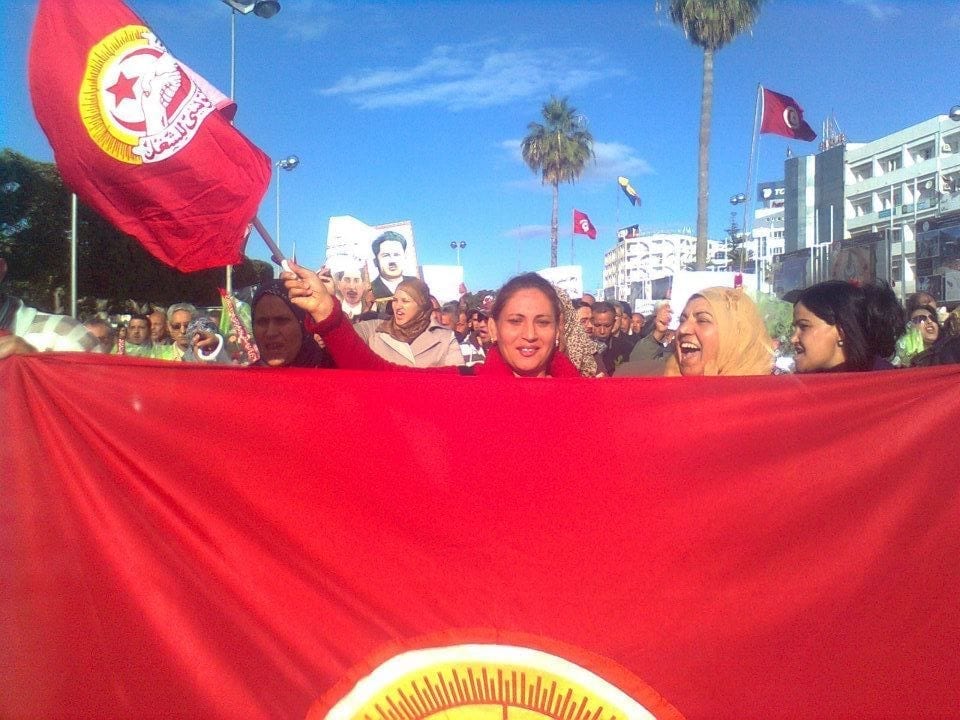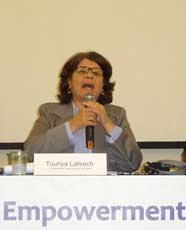
Oct 9, 2015
For its role in brokering a peaceful path to democracy, Tunisia’s labor movement today was named a co-recipient of the Nobel Peace Prize.
The Nobel Committee recognized the Tunisian National Dialogue Quartet—comprised of longtime Solidarity Center ally the Tunisian General Labor Union (UGTT), the Tunisian Confederation of Industry, Trade and Handicrafts, the Tunisian Human Rights League and the Tunisian Order of Lawyers—for establishing “an alternative, peaceful political process at a time when the country was on the brink of civil war.”
The Quartet, formed in 2013, was “instrumental in enabling Tunisia, in the space of a few years, to establish a constitutional system of government guaranteeing fundamental rights for the entire population, irrespective of gender, political conviction or religious belief,” Nobel Committee Chairman Kaci Kullmann Five said at the presentation ceremony.
“This is a great joy and pride for Tunisia, but also a hope for the Arab World,” UGTT chief Houcine Abassi told Reuters. “It’s a message that dialogue can lead us on the right path. This prize is a message for our region to put down arms and sit and talk at the negotiation table.”
In 2012, the UGTT received the AFL-CIO’s 2012 George Meany-Lane Kirkland Human Rights Award along with the labor federation of Bahrain, the General Federation of Bahrain Trade Unions, for their mobilization of thousands of people in their countries to carry forward a message of social justice during the popular uprisings that swept the Middle East in 2010 and 2011.
This is the second year in a row that worker rights activists have been honored with a Nobel Peace Prize. Last year Kailash Satyarthi, head of the Global March against Child Labor, also a Solidarity Center ally, shared the prize with girls’ education activist Malala Yousafzai.
Jul 14, 2014
Tunisia is among many countries around the world seeing rapid growth in their informal economies. In 2013, Tunisia’s informal economy accounted for 38 percent of the country’s gross domestic product (GDP), up from 30 percent in 2010.
A new study by the Tunisian General Labor Union (Union Générale Tunisienne du Travail, UGTT) and the Solidarity Center looks at factors fueling the expansion of Tunisia’s informal economy and offers recommendations for helping workers in the informal sector get job security and social protections they often do not have as domestic workers, street vendors and construction workers.
“The Current State of the Informal Economy in Tunisia as Seen through Its Stakeholders: Facts and Alternatives,” incorporates data from a field survey of 1,128 informal economy workers conducted by 100 UGTT young worker volunteers. The study, which also synthesizes information from available data, provides a rare look at a growing global phenomenon in which work is increasingly outsourced, subcontracted, temporary and part-time—leaving workers with no benefits or social protections.
Among the report’s findings:
• Workers in Tunisia’s informal economy lack basic decent work conditions such as social protection, health insurance, professional security and union rights and freedom.
• Young workers are especially vulnerable. Because they are concentrated primarily in the tourism sector, their wages are low and they have little job stability.
• The rapid growth of the informal economy has resulted in an annual 7 percent fiscal loss to the Tunisian national budget, badly impacting public spending and blocking the expansion of worker economic and social rights.
As UGTT Secretary General Houcine Abbassi says in a foreword to the report: “Because the informal economy neither contributes to the nation’s fiscal base nor offers workers social security protection, it is a serious challenge that must be addressed so as to ensure a national economic recovery and decent working conditions and social justice for all workers.”
Tunisia’s National Economic Dialogue Commission on the Informal Economy has adopted the study as an official reference document and has referred to it in its recommendations.
Read the full report.
Sep 27, 2013

Morocco union leader Touriya Lahrech will join women unionists at a gender equality conference in Casablanca. Credit Tula Connell/Solidarity Center
Nearly two dozen women trade unionists from Algeria, Egypt, Jordan, Tunisia and Palestine are set to meet next week for a unique skills-building and strategy conference in Casablanca, Morocco.
The Solidarity Center-sponsored Women’s Regional Advocacy Conference for the Middle East and North Africa region will bring together women leaders from seven union bodies to hone concrete skills, such as communications outreach and message development, and to support union-building initiatives that women leaders have identified as most important. Women representing the gamut of workers—from public sector employees to those toiling on farms—will share and learn strategies for strengthening women’s voices in their unions, their workplaces and in society.
The Sept. 30–Oct 1 conference continues the Solidarity Center’s series of trainings with union partners around the world. The Solidarity Center is committed to helping train women activists to become more effective advocates for gender equality at the bargaining table and within union structures.
In July, the Solidarity Center hosted more than 100 labor and community activists from 20 countries for the two-day conference, “Women’s Empowerment, Gender Equality and Labor Rights: Transforming the Terrain.” Touriya Lahrech was among those taking part, and she will welcome participants to the Casablanca conference. Lahrech is coordinator of the Women’s Department at the Confederation Democratique du Travail in Morocco.
Participating union bodies include: the Egyptian Democratic Labor Congress (EDLC); the Egyptian Federation of Independent Trade Unions (EFITU); the Federation of Independent Trade Unions of Jordan (FITU); the Palestinian General Federation of Trade Unions (PGFTU); Algeria’s SNAPAP; and the Union Générale Tunisienne de Travail (UGTT).


